- Home
- Veronica Roth
The End and Other Beginnings Page 8
The End and Other Beginnings Read online
Page 8
Darya didn’t quite understand what her father meant, but she knew there was something beautiful in it all the same.
Then she heard something—quickening breaths from the man across from them. She saw a bead of sweat roll down the side of his forehead. He looked so harmless—he was short, with salt-and-pepper hair and a white collared shirt. His slacks were pressed, creased. He was not a killer. But the peculiar blend of fear and determination in his eyes was enough to make Darya hold her breath.
As the man in the mask moved to get off the bus, he took a canister from his bag and dropped it on the ground. It was an object she had only seen in pictures—dull metal, about six inches long, as thick as her wrist, with an opening at one end to let out the gas.
Someone screamed. Darya’s father clapped his hand over her mouth and nose, and lifted her up from the abdomen. He ran toward the front of the bus, shoving people out of his way with his elbows. Darya fought for air, but the hand prevented her from taking a breath.
Her father shouldered his way out the bus door. Against her will, Darya’s body began to struggle against her father’s grasp, fighting for air. Her father sprinted down the street and into an alley just as she began to see spots.
He took his hand from her mouth, and she gasped.
He had not had time to cover his own mouth. What if he inhaled some of the gas? What if he was infected? She choked on a sob. What if he died?
“It’s okay, Dar.” He gathered her close to his chest. “I held my breath. We’re all right. We’re just fine.”
Technically, the only distinguishing feature of a Hearkener was the implant. It was placed in the temporal lobe of the brain. It didn’t protrude from the skin, but it contained a dye that created a weblike pattern on the right temple. Hearkeners were required to pull their hair away from their faces to reveal the pattern. Its purpose was to make them easily identifiable.
The implant made them what they were. They heard music everywhere—as long as there were people, there was music.
The first time she saw a licensed Hearkener was outside the Minnesota School for Hearkeners, on the fifth step from the bottom of thirty long, low steps. They had not made it to the testing center the day of the bio-bomb, but they went three days later, this time walking the whole way instead of taking the bus.
Her father stood beside her, clutching her hand. They both paused to watch the Hearkener woman walk past.
She was tall and slender, with hair the color of earth and the same pale skin Darya’s mother had. She walked without a bounce in her step, but at the same time, her feet were light on the cement. She wore a knee-length coat that snapped when the wind caught it. The pattern on her temple was iodine-black, but it was the last thing Darya noticed.
All Darya could think was that this Hearkener of Death was the most beautiful woman she had ever seen, and she wanted to be just like her.
As the Hearkener passed Darya and her father, she tilted her head, the way a person does when they are trying to hear something. Her footsteps slowed for just a moment, and she closed her eyes.
After the moment passed, she looked Darya’s father in the eye and smiled. Despite the curl of her lips, a troubled look remained in her eyes. She kept walking.
Three weeks later, Darya’s father died of the infection, and that Hearkener was the only person who ever heard his death song.
Darya passed the test, and her mother enrolled her in the Minnesota School for Hearkeners that fall. Though Darya’s mind was still muddled with grief, it was what her father had wanted for her, so she went.
Her first impression of the place was that it was too large for her. Even the front steps were vast, made of wide slabs of a dark, matte stone. The building itself was tall, made of black glass with girders that formed a huge X across the front. A giant clock, fixed to the front of the building, told her she had five minutes to get to her first class.
She looked at the piece of paper the school had sent her, along with half a dozen packets and information sheets, to tell her where to go on her first day. All the new students took classes together until they tested into particular levels of musical study or until they chose their instrument specialties.
The schedule said: Hour 1, Introduction to Hearkener Study, Room A104.
Darya looked up when she passed through the doors. She couldn’t see much past the security barrier. A stern-looking man in a black uniform told her to put her bag on a black conveyor belt that would take it through a scanner. She then had to stand in what looked like a globe with a tunnel cut through it so that it could scan her body. She had gone through both when she took her tests here, but her father had been with her then. This time she was afraid. What if they didn’t let her through?
But another man, on the other side, handed her the bag and let her pass him. The hallway here was completely different from the dingy, green-tiled hall that had been in her old school. Here, the floors were white marble—or at least something that looked like marble—and the walls were navy blue. Even the lockers were elegant—made of dark wood, they lined the walls as far as she could see.
She looked at the first room she passed—Room A101. She was close. She walked past another section of lockers, and glanced at the rooms to her left and right. A104 was on the left. Taking a deep breath, she walked in.
The room was oddly silent. Ten other children her age sat at long wooden tables inside. She found an empty seat near the back, next to a densely freckled boy tapping out a rhythm on the table with his pencil.
The bell rang. An older woman with gray curly hair and a chunk missing from her eyebrow strode in. She wore the Hearkener uniform: a black trench coat, buttoned up to her throat, and gray pants. Darya leaned to the side to see what color the woman’s implant was. Red. That meant she heard life songs rather than death songs.
The woman cleared her throat, though there was no reason to—no one was talking.
“Hello,” she said. “Let’s not bother with introductions. Oh, except me. We go by surnames here, and mine is Hornby. I’ll be giving you the rundown of Hearkener history.”
Darya knew the basics—that the Hearkener implant had something to do with string theory, and what it did was channel the vibrations of the human body somehow and make them into music. But she felt strangely exposed, without knowing more.
“String theory became widely accepted in the early part of the century,” Hornby said. “Can anyone tell me what string theory is, basically? Yes—how about you—what’s your name?”
The boy next to Darya had raised his hand. “Christopher Marshall, ma’am.”
“‘Hornby’ will do, Marshall. Go ahead.”
“String theory is the theory that subatomic particles are one-dimensional strings instead of three-dimensional, and that the one-dimensional strings form the fabric of the universe.”
“Good,” said Hornby. “Also, the strings are constantly vibrating. That’s important to remember because when Dr. Rogers created the first implant, all it did was channel the vibrations and their various frequencies and translate them into music. It was her successor, Dr. Johnson, who refined the implant to filter out all frequencies but those of human cells, so it was only people who made music. Anyone want to tell me why he would do a thing like that? You there—your name . . . ?”
“Samanth—uh, I mean Brock,” a girl in the front row said. “He said he just wanted to see if it was possible.”
“In fact, that is what he said, but we have since determined it was so he could hear the music his dying wife made.” Hornby added, “He had a friend try out the implant so that she could transcribe the music. She was the first Hearkener. But the implants didn’t stop there.”
Here she paused and tapped the red dye on her temple with her index finger.
“The last developer of the implant discovered that he could filter out either the vibrations of decaying cells or the vibrations of regenerating cells. In other words, he could make the implant play the sound of a person’s life
or the sound of their death. For a long time, hardly any Hearkeners chose to hear death songs. Now that death is so common, those Hearkeners are in high demand.”
Darya remembered the look the Hearkener who had heard her father’s death song had given him. She had seemed almost bewitched by it. Darya didn’t think that woman had chosen the death songs because they were in higher demand.
Hornby clapped her hands. “Now that that’s out of the way, I would like to call each of you up so that I can listen to your life song and tell you what instruments it seems to include. I say ‘seems’ because there are obviously no actual instruments involved in a person’s life song. Certain sounds merely remind us of certain instruments. This is important because, in your first year here, you will be selecting two of the three instruments you are required to master. Much of your time will be spent trying out each of them to see which ones you gravitate toward. Hopefully my evaluation will steer you in the right direction.”
It had been a very brief history lesson. Darya sat in her seat with her hands clutched around the edge of the chair as each of the eleven children in the class walked up to the front of the room so Hornby could listen to them. She didn’t want to go. She didn’t want to let that woman analyze her. She didn’t know why, but it felt far too personal, far too intimate for a setting like this.
It wasn’t long before Hornby pointed to her and bent her finger, beckoning Darya forward. Darya got up—too fast; she knocked the chair over and had to set it right again—and walked to the front of the room, her hands fidgeting at her sides. When she stood in front of Hornby, the woman asked her, “Your name?”
“Darya Singh,” she said.
“Singh.” Hornby laughed a little. “Well, that’s convenient. Let me listen to you for a bit.”
Hornby focused her attention on Darya’s face, though she wasn’t exactly looking into Darya’s eyes. She stared for a few seconds, and then a few more seconds . . . and then Darya became aware that Hornby had been staring at her for much longer than she had stared at anyone else . . . and then Hornby rocked on her heels, as if something had blown her backward.
“My goodness,” she said quietly. Then she seemed to come to her senses, and said, more briskly, “I hear . . . violin, cello, piano, some voice, trombone, trumpet, drum . . . there are more, but those are the dominant instruments.”
She leaned a little closer to Darya’s face, so that Darya could see a dart of blue in her otherwise green eyes.
“I’ve never heard so much dissonance in a life song before,” she said quietly, so that only Darya could hear.
And that was the beginning of Darya’s education as a Hearkener.
“When do you get the implant?”
Darya stabbed a piece of lettuce with her fork. After seven years at Hearkener school, she had passed the final test, an achievement half of her class hadn’t managed. And all Khali wanted to know was when she would get to work. But that was Khali—all work and no play.
“A week from tomorrow,” she said.
“Oh.”
“It’s soon, I know.”
Khali frowned. “What?”
“A week. It’s hardly enough time to determine my entire future.”
Khali’s expression was still blank. Darya felt like she had started speaking another language without meaning to. She raised her eyebrows at her older sister.
It was midday, but the windows were boarded up, so it felt like night in the kitchen. Wood wouldn’t keep the infection at bay if someone set off a bio-bomb nearby, but it was better than nothing. The battery-operated lantern on the table glowed orange, with fake flickers so that it imitated fire.
Khali lived with their mother now, in their childhood home. Darya had stopped coming back during the holidays three years before, and now only saw Khali when they went out to eat, or when she was sure her mother would be asleep.
“I don’t understand,” Khali said. “What decision needs to be made?”
“The decision.” Darya scowled. “You know—life songs or death songs? It’s a huge choice. It changes everything.”
“But you’re going to choose death songs,” Khali replied tersely. “Right? Because you want to record Mom’s song before it’s too late. Right?”
Darya pushed the piece of lettuce around her plate.
“She’s only got a few weeks left if she doesn’t get the transplant. At most, Darya.”
Darya did know.
“She won’t get another Hearkener! We don’t have enough money as it is!” Khali was shaking her head. “I can’t believe you wouldn’t do this for her. I can’t believe you.”
Darya looked up, her lips pursed.
“I can’t believe you,” she said. “She’s already controlled my life enough; I’m not going to let her control the rest of it, too!”
“What do you mean? She hasn’t controlled you.”
“What little childhood we had she took from us,” said Darya. “Kids aren’t supposed to think, ‘Oh, Mommy’s drunk again, so I’d better stay away from her.’ Kids aren’t supposed to take care of their parents. We’ve done enough for her. I’m not doing this for her.”
Khali’s mouth was open, but she wasn’t saying anything. She just looked stunned.
Then she said, “You’ve only met the real her a few times, Darya. The woman you know is just the alcohol, stifling her.”
“The implant isn’t something you can undo, Khali. You choose death, you choose it forever. You can’t tell me it’s my duty to choose something just because our shitty mom is finally getting what was always coming to her.”
Darya clutched the edge of the table, waiting for Khali to scream at her, or call her names, or something. But Khali’s eyes just filled with tears, and her lower lip started to wobble.
“Then . . .” She gulped. “Don’t do it for her. Do it for me, so I can hear. . . . She’s the only parent I . . . Please, Darya.”
Darya carried her plate to the sink and scraped the remnants of her salad into the garbage disposal. She took a long time to clean her plate, scraping slowly, rinsing slowly. She didn’t want Khali to see the tears in her own eyes.
“I don’t know if I can,” she finally said.
“Black or red?” the nurse asked again.
All her life Darya had been developing a resistance to obligation of any kind. No one had taught her to; maybe the world had taught her to. People who set off bio-bombs did so out of a religious obligation to hasten the apocalypse. The pictures she had seen of the bombers did not reveal any delight in the prospect of the world ending—they tried to stay alive in the aftermath of their attacks only so that they could attack again.
Obligation was dangerous because it muddled the mind. Did she want to choose red to defy her mother or because she really wanted it? Did she want to choose black for her sister’s sake? How could she know what she really wanted with so many competing obligations—to herself, to her mother, to her sister, to her late father?
Darya remembered the Hearkener’s face as she listened to Darya’s father’s death song, distress and warmth competing for dominance, like she protected a secret, and Darya longed to understand it. It was that whisper of longing that made the decision for her.
“Black,” she said.
The nurse put the red cylinder aside and set the black cylinder on a tray next to the hospital bed. She wrapped rubber tubing around Darya’s arm to make the veins stand out. Darya felt her pulse in each one of her fingertips, and a harsh sting as the needle went in. The nurse removed the rubber tubing and, with a small smile, flipped the switch that would start the IV drip.
Darya was supposed to be awake for the procedure, so the doctors would know they hadn’t damaged her brain while inserting the implant. But she wouldn’t remember any of it, thanks to whatever was in the IV bag, and she was grateful. She didn’t want to remember them peeling back her scalp and drilling into her skull and inserting things into her temporal lobe, the part of the brain that processed sound.
&
nbsp; A haze of images was all she retained to remind her that time had passed. Gradually she became aware of someone sitting in front of her, but it looked like she was hidden behind a white film. Then a face surfaced, and it was Khali’s. Her mouth was moving, but Darya couldn’t hear her. There was something over her ears.
Khali covered her eyes momentarily, as if chastising herself, and then took out a pad of paper and a pen. On it, she wrote, They don’t want you to hear anyone yet. Said it would be too overwhelming. Keep the ear covers on. How do you feel?
Darya’s head throbbed, especially over the right side, where the implant was. Other than that, she just felt heavy, like she could drop right through the mattress.
She didn’t want to try to explain all that to Khali, so she just put her thumb up and tried to smile, though she was sure it looked more like a grimace. Even her cheeks were heavy.
Khali’s eyes were wet. She scribbled another note on the pad:
Thank you.
Darya knew what Khali was thanking her for. If she hadn’t been so tired, she might have tried to say that she had not made her choice for Khali, had not made it for their mother—that she wasn’t even sure she wanted to hear her mother’s song, despite what she had chosen. But soon the weight collected behind her eyes, dragging her back to sleep.
She woke up later to dark skies showing between the blinds, and a nurse peering at the incision in her scalp. They had buzzed some of her hair—eight square inches of it, in fact. She had demanded to know the exact amount.
Darya’s mother had had beautiful hair when she was younger, a reddish brown that shone like a penny in sunlight. It had come down to the middle of her back, incorrigibly wavy—no matter how hard she tried to straighten it, it refused to stay that way. Darya had often thought it was a shame her mother’s hair would die with her, even though she liked her own the way it was.

 Divergent
Divergent Insurgent
Insurgent Allegiant
Allegiant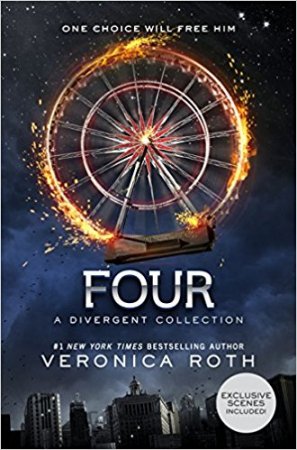 Four: A Divergent Collection
Four: A Divergent Collection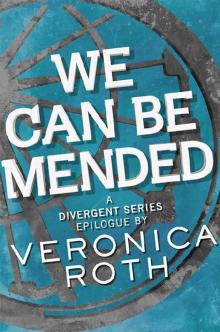 We Can Be Mended
We Can Be Mended The Son
The Son The Transfer
The Transfer The Traitor
The Traitor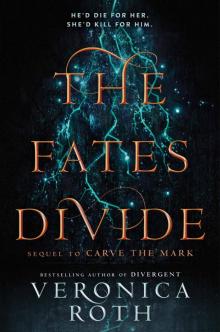 The Fates Divide
The Fates Divide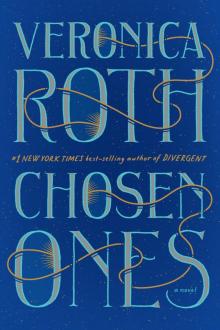 Chosen Ones
Chosen Ones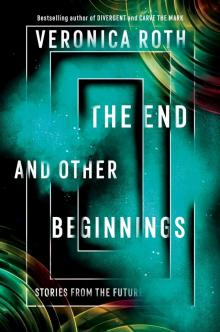 The End and Other Beginnings
The End and Other Beginnings The Transfer: A Divergent Story
The Transfer: A Divergent Story Four_The Son
Four_The Son Divergent dt-1
Divergent dt-1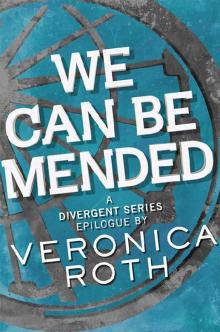 We Can Be Mended_A Divergent Story
We Can Be Mended_A Divergent Story![Ark [Forward Collection] Read online](http://i1.bookreadfree.com/i1/03/31/ark_forward_collection_preview.jpg) Ark [Forward Collection]
Ark [Forward Collection] Four_The Traitor
Four_The Traitor 10.22.13_The World of Divergent_The Path to Allegiant
10.22.13_The World of Divergent_The Path to Allegiant Insurgent (Divergent)
Insurgent (Divergent) The Divergent Series Complete Collection
The Divergent Series Complete Collection Divergent Collector's Edition
Divergent Collector's Edition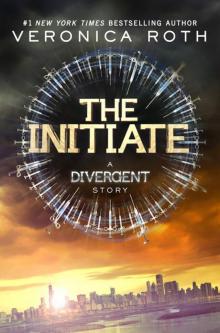 Four_The Initiate
Four_The Initiate Insurgent d-2
Insurgent d-2